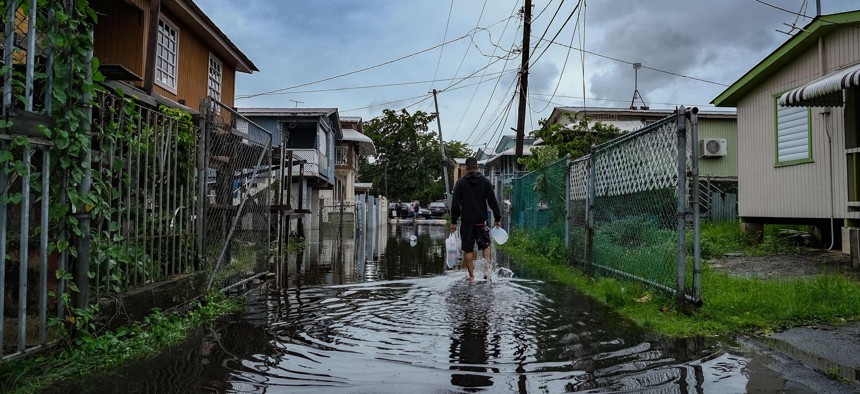
A man walks down a flooded street in the Juana Matos neighborhood of Catano, Puerto Rico, on Sept. 19, 2022, after the passage of Hurricane Fiona. - Hurricane Fiona smashed into Puerto Rico, knocking out the US island territory's power while dumping torrential rain and wreaking catastrophic damage before making landfall in the Dominican Republic on Sept. 19. Photo by -/AFP via Getty Images
Puerto Rico Storm Victims Report Waits of Over 5 Hours on Calls to FEMA
Long hold times contacting the Federal Emergency Management Agency are just one challenge emerging as the nation responds to Hurricane Fiona, which swamped the commonwealth last month, along with Hurricane Ian’s devastating hit to Florida.
When it comes to disasters, the nation’s attention is now focused heavily on Florida and the destruction Hurricane Ian’s high winds and severe flooding dealt the state last week. But as recovery efforts get underway there, survivors in Puerto Rico of Hurricane Fiona, which dumped up to 30 inches of rain in some areas on Sept. 18, are getting stuck on hold for hours as they call the Federal Emergency Management Agency for financial help, according to advocates.
“When you have communities without power, no battery for cell phones, FEMA cannot be expecting that they are going to wait [an average of] 358 minutes to fill out the application. That is unacceptable,” Maritere Padilla Rodríguez, director of policy and advocacy for the Hispanic Federation in Puerto Rico, said during a webinar Tuesday with White House officials and representatives from housing groups.
Caitlin Durkovich, a special assistant to President Biden and the National Security Council’s senior director for resilience and response, said the administration is “re-envisioning” how agencies respond to disasters to try to ease the red tape and delays survivors often run into seeking assistance after events like hurricanes and floods.
“I want to emphasize that he knows that we can do better,” Durkovich said of Biden during the webinar, organized by the National Low Income Housing Coalition.
Biden visited Puerto Rico on Monday, where he met with victims of Hurricane Fiona and promised more than $60 million in aid to help coast areas better prepare for storms.
Durkovich expressed sympathy for disaster survivors navigating cumbersome and bureaucratic processes, along with documents that can be difficult to understand. “They are hard for me to read,” she said, acknowledging it would only be tougher for people who may have lost homes, and who may not have access to phone service.
“We are working to address these challenges,” she told the advocates.
These efforts include trying to make written materials more readable, “so that we minimize the misunderstanding and confusion,” she said, as well as creating a “single entry point” for survivors so that they only have to enter information one time in order to access assistance, rather than providing it to multiple federal agencies.
Another step the administration took to simplify bureaucracy for people dealing with the loss of homes or businesses came in September.
That’s when FEMA announced it is no longer requiring that people seeking assistance show a deed or a title for a home or business damaged in a disaster. Home or business owners can instead provide alternatives like bills for major repairs, a statement from a public official or, in the case of mobile home owners, a self-declaration that they own the property.
However, Ariadna Godreau Aubert, executive director of a nonprofit legal assistance organization, Ayuda Legal Puerto Rico, said people are being denied assistance by agency workers who do not seem to know about that change.
“It’s quite horrible,” she said. “I have been receiving complaints about inspectors refusing to accept documentation that is not a formal title.”
Durkovich recognized the problem. “You're not the first to say that they do not understand this and are not accepting the policy changes,” she said. FEMA is working on this, she said, but assured advocates she will remind the agency that the issue needs to be fixed.
Jenn Jones, chief of staff to Housing and Urban Development Secretary Marcia Fudge, said the agency has sent millions of dollars to communities hit by natural disasters in the last two years to help them better withstand similar events in the future.
Jones noted that, as part of Biden's emergency declaration after Puerto Rico suffered severe flooding in February, HUD granted greater flexibility to allow funds for a number of programs to be used on relief. Those included Community Development Block Grants, Housing Opportunities for Persons With AIDS, HOME Investment Partnerships, and the Housing Trust Fund.
For HUD, these are “bread-and-butter programs,” she said, “which offer significant abilities to use resources for essentials like food, clothing, water and utilities.”
In Florida, Kathy Grunewald, an attorney specializing in disaster relief for the nonprofit Legal Services of North Florida, said the region is still assessing the damage from Hurricane Ian. But, she said, “many mobile home parks have been completely destroyed.”

The residents, she said, are now living with family or friends, or in shelters. Many did not have insurance or did not have coverage for wind storms.
“The long-term prospects and maybe even the short-term prospects are grim. They will be looking for housing assistance from FEMA temporarily and, after that, the outlook in Florida, like all over the country for affordable housing, is going to be very difficult.”
Grunewald noted that it took two years after Hurricane Michael hit Florida in 2018 for the state and localities to receive federal Community Development Block Grant disaster relief funds.
“Hopefully it will not be that long this time,” she said.
Kery Murakami is a senior reporter for Route Fifty.
NEXT STORY: The White House Has Raised Contract Spending Goals for Small, Disadvantaged Businesses







